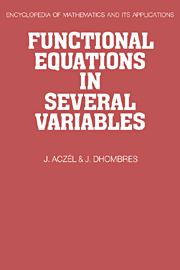As the size of the bibliography (which contains only a fraction of the existing literature on functional equations) indicates, it would be hopeless to try to present in one chapter of this book an even approximately complete history of functional equations (in several variables). So we restrict ourselves to a few notes (cf. also Aczél 1966c, pp. 5–12; Dhombres 1986) on the beginnings of this part of mathematics, some milestones in its development and a sketchy panorama of its present aspirations and applications.
Definition of linear and quadratic functions by functional equations in the Middle Ages and application of an implied characterization by Galileo
The emergence of functional equations was necessarily connected to the development of the notion of function, but we cannot, of course, go into the details of that history here. Because of the absence of any notion of function it would be very contrived to interpret passages of Euclid or Archimedes as even disguised formulations of functional equations. One should also differentiate between stating, for given functions, properties which amount to functional equations satisfied by them, and determining all functions with such properties, that is, solving these functional equations.
An important historical role of functional equations has been the definition of functions by functional equations (or their paraphrases). But often it was not shown (though it was implied) that these functions are the only solutions of these equations.
